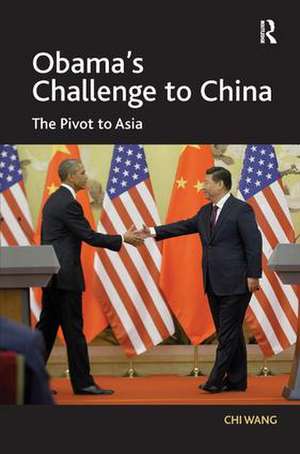Obama's Challenge to China: The Pivot to Asia
Autor Chi Wangen Limba Engleză Hardback – 28 iun 2015
| Toate formatele și edițiile | Preț | Express |
|---|---|---|
| Paperback (1) | 241.15 lei 6-8 săpt. | |
| Taylor & Francis – 12 oct 2017 | 241.15 lei 6-8 săpt. | |
| Hardback (1) | 769.90 lei 6-8 săpt. | |
| Taylor & Francis – 28 iun 2015 | 769.90 lei 6-8 săpt. |
Preț: 769.90 lei
Preț vechi: 1030.76 lei
-25% Nou
Puncte Express: 1155
Preț estimativ în valută:
147.32€ • 153.81$ • 121.93£
147.32€ • 153.81$ • 121.93£
Carte tipărită la comandă
Livrare economică 04-18 aprilie
Preluare comenzi: 021 569.72.76
Specificații
ISBN-13: 9781472444424
ISBN-10: 1472444426
Pagini: 330
Dimensiuni: 156 x 234 mm
Greutate: 0.77 kg
Ediția:1
Editura: Taylor & Francis
Colecția Routledge
Locul publicării:Oxford, United Kingdom
ISBN-10: 1472444426
Pagini: 330
Dimensiuni: 156 x 234 mm
Greutate: 0.77 kg
Ediția:1
Editura: Taylor & Francis
Colecția Routledge
Locul publicării:Oxford, United Kingdom
Notă biografică
Chi Wang worked at the U.S. Library of Congress' Chinese section for 47 years and has been an adjunct professor at Georgetown University since 1969. He served as an advisor on China affairs for several U.S. presidential administrations. Dr. Wang has published many books and articles on U.S.-China relations. He has a Ph.D. in history from Georgetown University.
Recenzii
’As objective and detailed an account as we will ever have of the Obama administration’s conduct of Sino-American relations and the events, trends, and issues now pushing the two countries toward rivalry. Perfect for classes on US-China relations.’ Ambassador Chas W. Freeman, Jr. (USFS, ret.), former Assistant Secretary of Defense, USA ’China’s new leader Xi Jinping says he wants a new pattern of great power relations with the United States. Today, as Dr Wang assesses, this relationship is somewhere between deterrence and reassurance. His comprehensive, detailed and well-documented study puts in context the issues that must form a strategy for managing relations with a country that will shape the world of the 21st century.’ Richard H. Solomon, former Assistant Secretary of State for East Asia and the Pacific; former President of the United States Institute of Peace ’In Obama’s Challenge to China, Chi Wang argues that President Obama’s China policy shifted between erring first on the side of deference and then on the side of confrontation, and he also argues that Beijing was not reticent in asserting its own power in this regard. This volume calls for a new, shared vision, one anchored in the construction of inclusive economic and security institutions in Asia rather than the current divisive effort to construct parallel, but competitive, economic and security structures.’ David M. Lampton, Johns Hopkins SAIS, USA
Cuprins
Introduction; Part I Obama and His China Team; Chapter 1 US Asia-Pacific Policy in Context; Chapter 2 Obama and His China Team; Part II Obama’s China Policy; Chapter 101 An Overview; Chapter 3 The “How-to-Save-the-World Club”; Chapter 4 A Changing China Strategy; Chapter 5 A “Pivot” in the Relationship; Chapter 6 Official Visits and Unexpected Tests; Chapter 7 Governments in Transition; Chapter 8 Conflict on the Rise; Chapter 102 Conclusion; Part III The Issues; Chapter 9 Economic Relations; Chapter 10 Military Relations; Chapter 11 Third Party Factors; Chapter 12 Multilateral Partnerships; Chapter 13 Climate Change; Chapter 14 Human Rights; Chapter 103 Conclusion; Chapter 104 Postscript;
Descriere
This book explores U.S.-China relations under the leadership of President Barack Obama and discusses how his decisions set the stage for a new era in U.S.-China relations. The book outlines Barack Obama’s own personal worldview and the backgrounds of the advisors that made up his China team; it details the major events in U.S.-China relations from 2009 to 2014; and addresses Sino-U.S. relations and interactions with regards to various issues: economics, military relations, climate change, human rights, and multilateral cooperation in regional and international organizations. Finally, the book ends with timely suggestions for how to improve the U.S.-China relationship and ensure a peaceful future.
